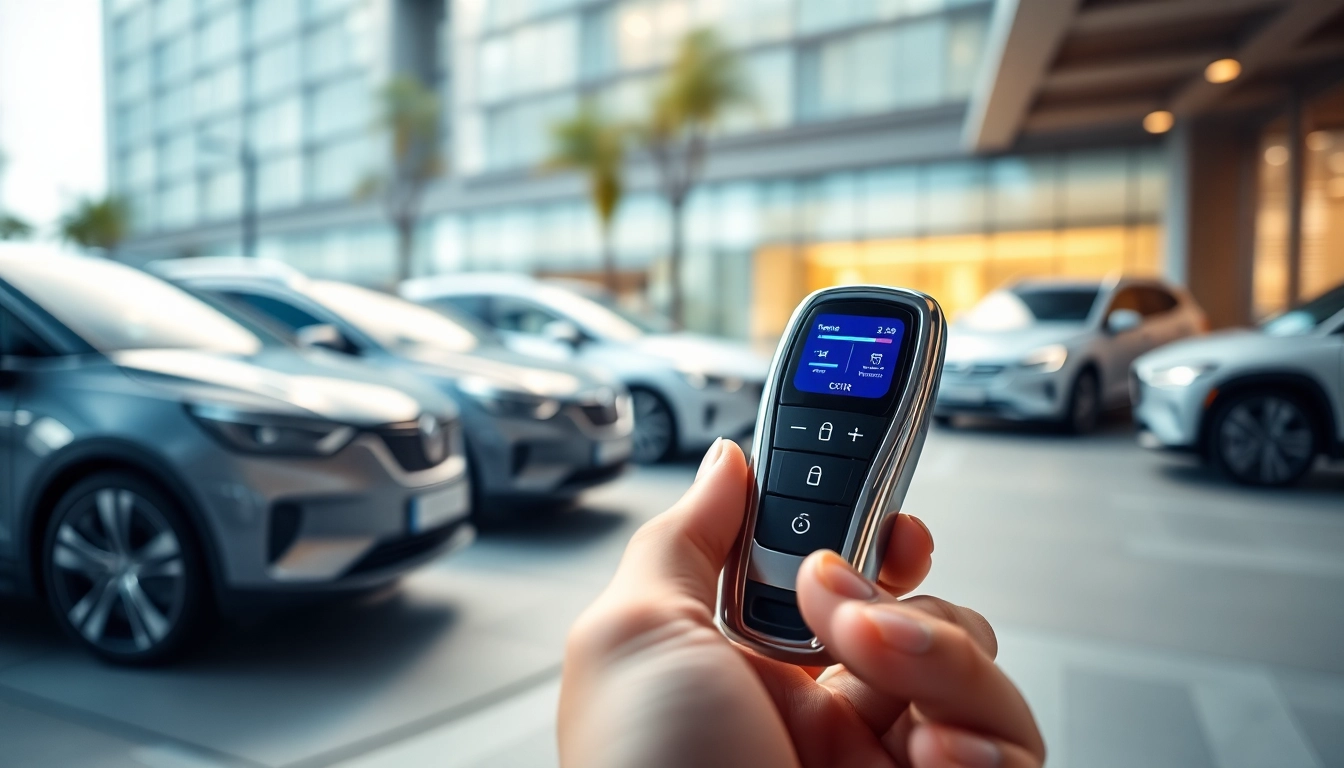Introduction to Keys for Electric Cars
As the automotive industry undergoes a transformative shift towards sustainable energy, the technology surrounding vehicle entry and operation is evolving rapidly. Keys for electric cars represent a significant advancement, integrating advanced technology in ways that enhance convenience and security. Understanding these innovations provides insights into how far car access technology has come and how it will shape the future of driving.
The Evolution of Car Keys
The concept of the car key has changed dramatically since the inception of the automobile. Originally, vehicles operated with a simple metal key that physically turned a lock. Over the years, as automotive technology advanced, so did the keys used to control these vehicles. Key fobs transformed how users interacted with their cars, allowing for remote locking, unlocking, and even engine start-up with the push of a button.
More recently, digital keys have emerged as game changers. These allow drivers to unlock and start their vehicles with their smartphones, using Bluetooth or RFID technology. This transition reflects a broader trend towards seamless connectivity and integration with technology that drivers already possess.
Understanding Electric Car Technology
Electric vehicles (EVs) are at the forefront of this technological wave. With their reliance on batteries and electric motors, EVs require innovative access solutions to replace traditional mechanics. The needs of electric vehicles align perfectly with the capabilities of digital keys, enabling functionalities that are not just convenient but secure as well. The use of smartphone applications to control access aligns with the growing trend of smart technology in homes and other daily life aspects.
Importance of Secure Access Systems
As vehicles become more connected, the security of these innovative access systems becomes paramount. Digital keys must safeguard against theft and unauthorized access, which can pose risks to both owners and manufacturers. Secure protocols and advanced encryption are essential to ensure that digital keys cannot be easily replicated or hacked. Understanding the importance of these systems helps consumers to appreciate the value of the technology that powers their electric vehicles.
Types of Keys for Electric Cars
Traditional Key Fobs vs. Digital Keys
Within the current landscape, traditional key fobs still exist alongside digital keys. Key fobs offer reliability and may not require smartphone dependency; however, they lack the advanced functionalities associated with digital systems. Digital keys allow for features such as access logs, customizable settings, and remote operation via mobile applications.
For example, a digital key might allow the owner to grant access to friends or family members temporarily without needing to provide a physical key or fob. This is particularly beneficial in multi-user situations where various individuals may need access to a vehicle. On the other hand, traditional keys can become cumbersome and carry the risk of being lost or damaged.
Smartphone Integration and Keyless Entry
Smartphone integration introduces an era of keyless entry that aligns with modern consumer expectations of convenience. Many electric cars now use applications that allow users to unlock doors, start the engine, and monitor vehicle diagnostics through their smartphones. This integration not only simplifies the user experience but also provides features like geolocation, enabling users to find their vehicles in crowded parking lots easily.
Manufacturers are increasingly focusing on this technology. Integrating keyless entry systems with smartphones means users can leave their physical keys at home, enhancing the simplicity of daily life. However, consumers must also consider the implications of relying on such technology, especially regarding security and battery life of the smartphones used.
Comparing Key Technologies Across Models
Different electric car manufacturers approach key technology with varying philosophies. Some brands prioritize simple user interfaces with basic functionalities, while others aim for comprehensive control through mobile applications. This variance can lead to different user experiences depending on the vehicle model.
Understanding these differences can help consumers make informed decisions when purchasing electric vehicles, as preferences for tech features will vary among individuals.
How to Maintain Your Electric Car Keys
Best Practices for Battery Care
Maintaining your electric car keys requires attention to the batteries that power them. It’s essential to periodically check the health of the battery used in traditional key fobs and ensure that mobile devices used for digital keys remain charged. Users should also replace key fob batteries as recommended to avoid unexpected failures.
For digital keys, enabling power-saving modes and limiting the number of active applications can help extend battery life, ensuring that these devices are functional when needed.
Storing and Protecting Your Keys
Proper storage can significantly impact the longevity of your keys. For traditional key fobs, it may be advisable to keep them in a designated spot away from extreme temperatures or moisture. For digital keys stored on smartphones, using comprehensive security features such as biometric locks and strong passwords adds a layer of protection.
Keeping backups, whether physical or digital, can be invaluable for ensuring access to vehicles should something go awry. Many electric car owners may find convenience in additional smart devices that will function even if their primary key fails.
Common Troubleshooting Techniques
While key technology can simplify access to vehicles, technical issues may arise. Common problems include keys not responding, connectivity issues, and battery failures. Practical troubleshooting steps include:
- Resetting the key fob or mobile application by following the manufacturer’s guidelines.
- Replacing batteries if responsiveness decreases.
- Pairing the digital key again with the vehicle if connection issues arise.
- Consulting the vehicle’s manual for specific error codes or issues.
These steps can often resolve issues quickly and efficiently, minimizing disruption for the user.
Key Innovations in Electric Car Technology
The Future of Keyless Systems
The future of keys for electric cars is undoubtedly tied to advancements in technology such as biometrics and remote cloud-based access systems. Upcoming innovations point towards systems that would not only grant vehicle access but also allow for personalized settings and security features that respond to the user’s unique fingerprint or face recognition.
These systems promise to enhance security, provide tailored driving experiences, and enable vehicles to verify the identity of their driver before granting access. As the technology progresses, consumers will likely seek out cars with the most advanced keyless systems, continuing the evolution of access solutions.
Security Enhancements for Electric Vehicles
With the growth of keyless access systems, security enhancements are becoming increasingly critical. Manufacturers are investing in advanced encryption protocols and anti-theft technology to ensure that only authorized users can access their vehicles. Innovations such as rotating encryption codes and multi-factor authentication processes provide layers of security designed to thwart potential thieves.
Education around security practices is paramount too, helping consumers understand how to protect their vehicle’s access methods effectively. With proper knowledge, users can select and utilize technologies that meet their security needs.
Regulatory Changes Affecting Key Technologies
As digital keys become more prevalent, regulatory bodies are beginning to examine the implications of electronic vehicle access technologies. Legislative changes may shape how manufacturers develop and implement key technologies to ensure consumer safety and privacy. These regulations will likely address vulnerabilities related to hacking and data breaches while promoting standards that enhance user confidence in their access systems.
Conclusion and Future Directions
Emerging Trends in Vehicle Access
The automotive world is undoubtedly transitioning towards more integrated technologies. Users have become accustomed to seamless experiences in all aspects of life, and the future of vehicle access is no different. The key innovations in electric cars are increasingly aligning with consumer expectations for security, accessibility, and convenience.
As EV adoption grows, so will the advancements surrounding keys for electric cars, leading to even more innovative features and techniques that enhance the overall user experience.
Consumer Preferences and Market Insights
It is also crucial to consider consumer preferences in the marketplace. Many drivers today prioritize connectivity and technology in their vehicles, signaling a shift in what is considered essential. As manufacturers respond to these demands, the offerings related to keys for electric cars are expected to expand, emphasizing ease of use and advanced functionalities.
Final Thoughts on Keys for Electric Cars
Understanding the evolving landscape of keys for electric cars helps both consumers and manufacturers stay informed about the innovations that drive the industry forward. From traditional fobs to advanced digital keys, the journey is highlighted by technological advancements that promote security, connectivity, and ease of use. As the electric vehicle market continues to grow, the evolution of access technology will undoubtedly be a key component in shaping the future of driving.



